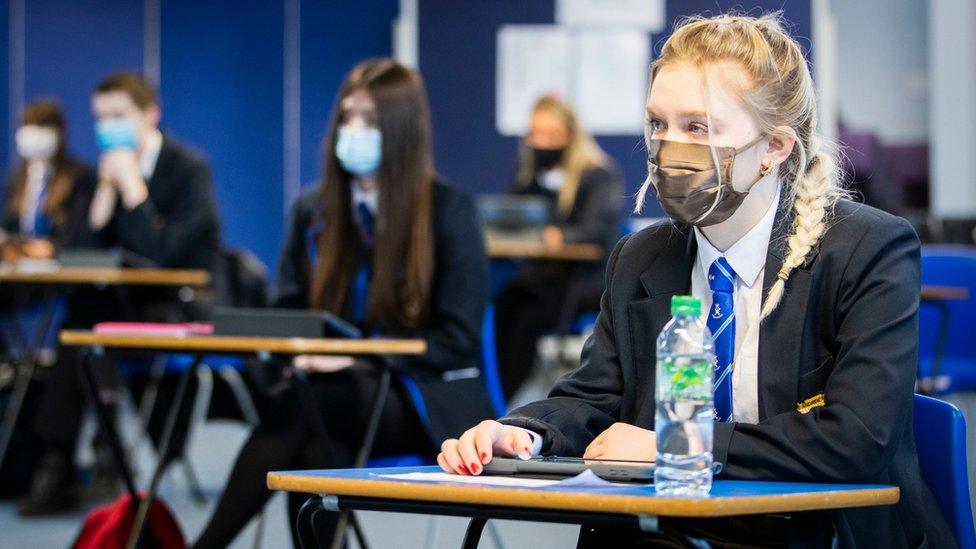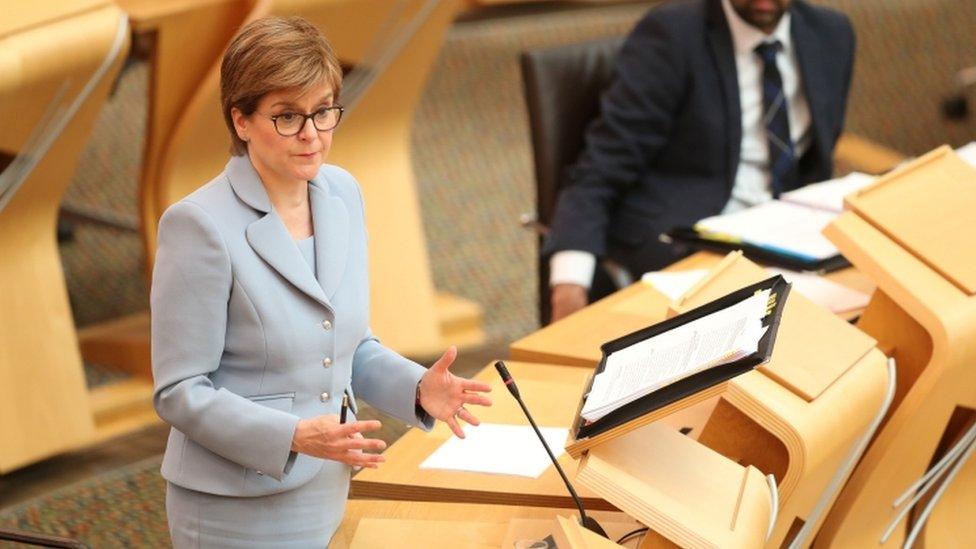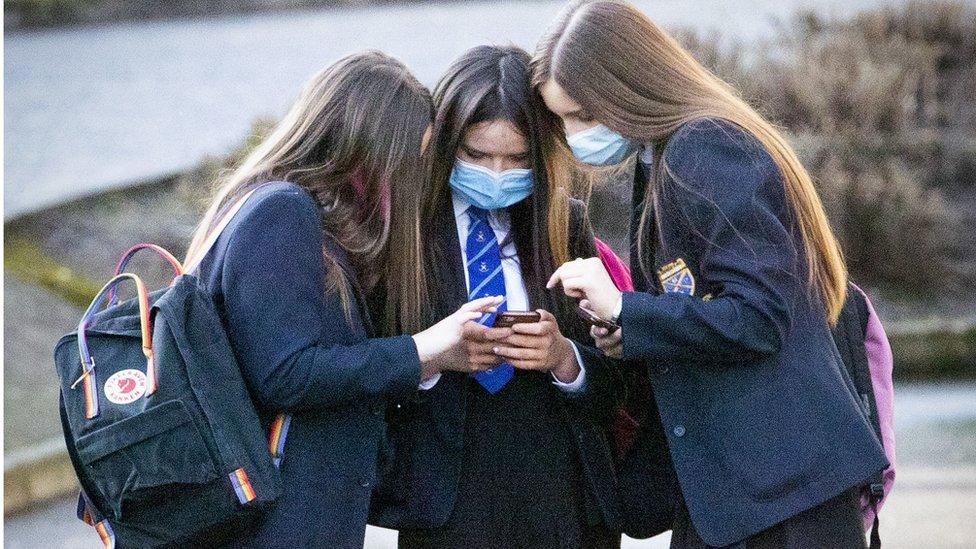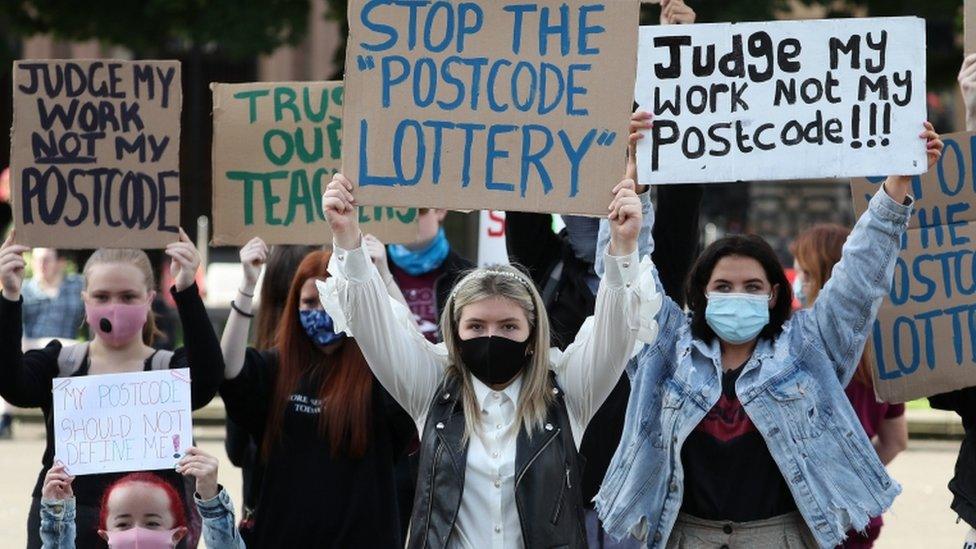School assessments: Nicola Sturgeon denies pupils face results 'shambles'
- Published

About 75,000 pupils across Scotland had their results downgraded last year before the government u-turned
Nicola Sturgeon has insisted that pupils will not have their results downgraded this year because of the past performance of their school.
Opposition parties say the country is facing a similar "shambles" to last year, when thousands of pupils received lower grades than they were expecting.
In many cases, this was because of an algorithm that took into account how schools had performed in the past.
But the first minister said this year's system was a "world away" from that.
Ms Sturgeon was responding to claims by Scottish Conservative leader Douglas Ross that the country's exams body was still seeking to use historical data this year - but was merely being more "sleekit" about how it was done.
Mr Ross told MSPs that an Education Scotland report published last week had said three quarters of Scottish councils were analysing results using historical data.
And he questioned how young people could have faith in the system "when the first minister's words do not match reality".
He said: "Inverclyde are holding data analysis meetings before submitting grades, Edinburgh are making adjustments based on previous attainment data and East Renfrewshire has a checklist to ensure that teachers compare this year's grades to the last three years.
"All of this in direct contradiction to the promise given by the first minister to this chamber last week, and reiterated a few moments ago."
Mr Ross went on to claim that this meant young people would "once again lose out based solely on where they go to school".
He added: "This is the same shambles as last year - it's just more sleekit because instead of the SQA marking pupils down at the end of the process, the system will force teachers and schools to do it first."

Ms Sturgeon insisted that teachers would have the final say on their pupils' grades
Ms Sturgeon accused Mr Ross of misrepresenting how the system will work, adding: "What Douglas Ross is trying to suggest happens is simply not the case."
The first minister said the awards this year are based on the judgement of teachers who look at the work pupils have done, and that there was "no past results or algorithms that dictate what a learner's grade will be".
However, she said that a "quality assurance process" would then look at whether a school's provisional grades were "significantly out of step with past performance".
If that is the case, Ms Sturgeon said the provisional grades would be checked again by the relevant teachers rather than by the SQA or Education Scotland.
She added: "If the teachers' judgement is that they stand by the result they gave, then that result stands - it is not changed.
"The provisional grades are then submitted to the SQA and they will not be changed because of a school's past performance.
"That is a world away from the situation last year where algorithms and the past performance of schools automatically changed the performance and the grades of some pupils."

Some pupils have already been told what their provisional grades are
Her comments echo those of Education Secretary Shirley-Anne Somerville, who gave a "cast-iron guarantee" earlier this week that the situation pupils faced last year would not happen again.
But Scottish Labour leader Anas Sarwar said that the pledge "means nothing without changes to the actual system", which he said was still failing some pupils who were facing exceptional circumstances, such as bereavement, during the Covid pandemic.
He raised the case of a teenager who has been shielding and has been told he will get the class average mark for a subject despite achieving higher grades before he had to stop attending school in person.
Mr Sarwar also called for a "no-detriment" appeals policy to be put in place to prevent pupils having their results downgraded rather than upgraded if they choose to appeal.
He said the country was already in the midst of a "second exams crisis", and that the government had failed to fix the system despite having had a year to do so.
'Deliberately misleading'
Scottish Greens education spokesman Ross Greer later said it was "incorrect" to say that the assessment system is based on teacher judgement, and accused the first minister of being either "deliberately misleading" or not understanding how grading will work.
Mr Greer said: "The fact remains that if your teacher thinks you deserve an A but, for reasons of family bereavement or personal illness, your assessment evidence says B, they have to give you the B.
"This was always going to be the problem if you based a grading system on demonstrated attainment in a year where pupils have barely had a chance to demonstrate that attainment due to school closures and self-isolation.
"The professional judgement of teachers simply isn't being respected."
What happened last year?

The Scottish government was forced to u-turn and upgrade the results of about 75,000 pupils last year following an outcry over how the final grades had been decided after exams were cancelled because of the Covid pandemic.
The results were to have been decided based on teacher estimates for each of their pupils based on their work during the school year.
These estimated grades were then fed through an SQA moderation system, which downgraded many of the marks handed out by teachers to bring them closer in line with previous years.
This meant that the system was more likely to penalise pupils at schools which had historically not achieved high exam grades - often those in less affluent areas.
Many pupils were also given lower grades than they had achieved in prelim exams at the start of the year.
Ms Sturgeon and John Swinney, who was the education secretary at the time, had both previously argued that basing grades on teacher estimates alone would damage the credibility of the results compared to previous years.
But they later told the SQA to reissue grades "based solely on teacher or lecturer judgement".
Last week, Mr Swinney's successor as education secretary - Ms Somerville - announced that both the SQA and Education Scotland would be reformed.

